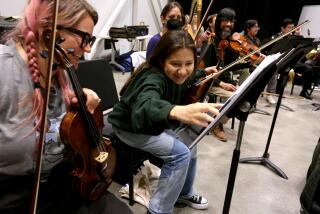Music Reviews : Early Birthday Present for Halsey Stevens
- Share via
A sparse audience of about 50 congregated at the University Church on the USC campus Tuesday night to hear the USC Contemporary Music Ensemble present a program that could have been subtitled “Who’s Afraid of 20th-Century Music?”
Nothing to fear, but much to savor in a concert that featured two major works by Halsey Stevens, professor emeritus at the university, who will celebrate his 80th birthday on Saturday.
The Quintet for flute, violin, viola, cello and piano featured assured playing from last-minute replacement Julie Mason (flute). The opening movement, “Pastoral,” immediately put one at ease with the music. As this 1946 work progressed, one realized how rare it is to find a piece of this vintage that doesn’t invite any comparisons with Copland, and yet is so accessible and rewarding.
The second movement Scherzo could have used more bite, but the Threnody was commited and passionate, the Fugue clear in spite of the resonant acoustics. Cellist David Mollenauer brought a strong, warm tone, and pianist Cynthia Bauhof-Williams solidified the ensemble.
The Septet of 1957 is remarkable in its instrumentation of two violas, two cellos, clarinet, bassoon and horn. The heart of the four-movement work is the Adagio, and ensemble director Donald Crockett molded his sensitive young musicians in a reading that was inexorable in building to a thoroughly satisfying finale. The enthusiasm of the audience’s response was clearly meant to be shared equally among performers and Stevens, who was present.
Sandwiched between the Stevens works was the Meditation and Bacchanale of James Hopkins, for flute, harp, cello and percussion. Though both halves of the composition received polished playing, the latter portion failed to generate the requisite excitement one would expect from the title.
Oboist Linda Gilbert and pianist Vicki Ray opened and closed the program with disparate works: “Aubade for the Continuation of Life” (1982) by William Bolcom, and “Lessons of the Sky” (1985) by Rodney Rogers. Bolcom’s work, despite committed playing, did not leave a memorable impression. Rogers’, on the other hand, demonstrated that true motivic development should not be confused with minimalism.
More to Read
The biggest entertainment stories
Get our big stories about Hollywood, film, television, music, arts, culture and more right in your inbox as soon as they publish.
You may occasionally receive promotional content from the Los Angeles Times.










